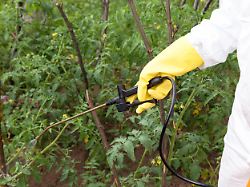risk of pesticides
Agricultural groups are said to have withheld studies
06/01/2023 11:57 am
A new study by two researchers from the University of Stockholm reveals that some agricultural companies have often not submitted studies on the risks of their crop protection products to the EU approval authority. In one case, the EU authority subsequently restricted the use of a pesticide on fruit and vegetables.
Some agricultural groups have repeatedly withheld relevant studies on the risks of their active ingredients from the EU approval authority. Researchers have now found that out, as reported by “Spiegel”.
The paper is based on a study by the chemist Axel Mie and the toxicologist Christine Rudén from the University of Stockholm. Together they checked whether agricultural companies had submitted all animal tests on potential damage to brain development in human fetuses and infants, which they had submitted to the USA, to EU authorities for the approval of new active substances. They come to the conclusion that in a quarter of the cases examined, these studies on so-called developmental neurotoxicity were missing when the drug was approved for the EU. According to Mie’s investigation, in three of the 35 cases investigated, the later disclosure of the withheld studies led to a reassessment of the substances.
This is also the case for the active ingredient abamectin, as it is called. According to “Spiegel”, the international agricultural company Syngenta did not submit two studies on animal experiments when the pesticide was approved in 2009. They had therefore shown that the substance can lead to delayed sexual development in female rat babies.
European authority learns of studies two decades later
However, the European Food Safety Authority (EFSA) only found out about these studies about a decade later. The European health experts reacted and then reduced the permitted residue levels of the substance that may be found on cucumbers, tomatoes and zucchini. The reason given by EFSA in its 2021 risk report was that an “acute risk” for people who consumed fruits and vegetables treated with abamectin could not be ruled out. Pests on apples and pears should therefore no longer be controlled with abamectin. For this purpose, the active ingredient must also be used more sparingly in strawberries.
When asked by the magazine, Syngenta writes that all data requirements of the EU have always been met. The studies were carried out as part of the approval process in the USA. In the EU procedure, they were not a “regulatory requirement” at the time, so they were not submitted “proactively”. The group assumed that they had not found any new information about the toxicity of the active ingredient.
